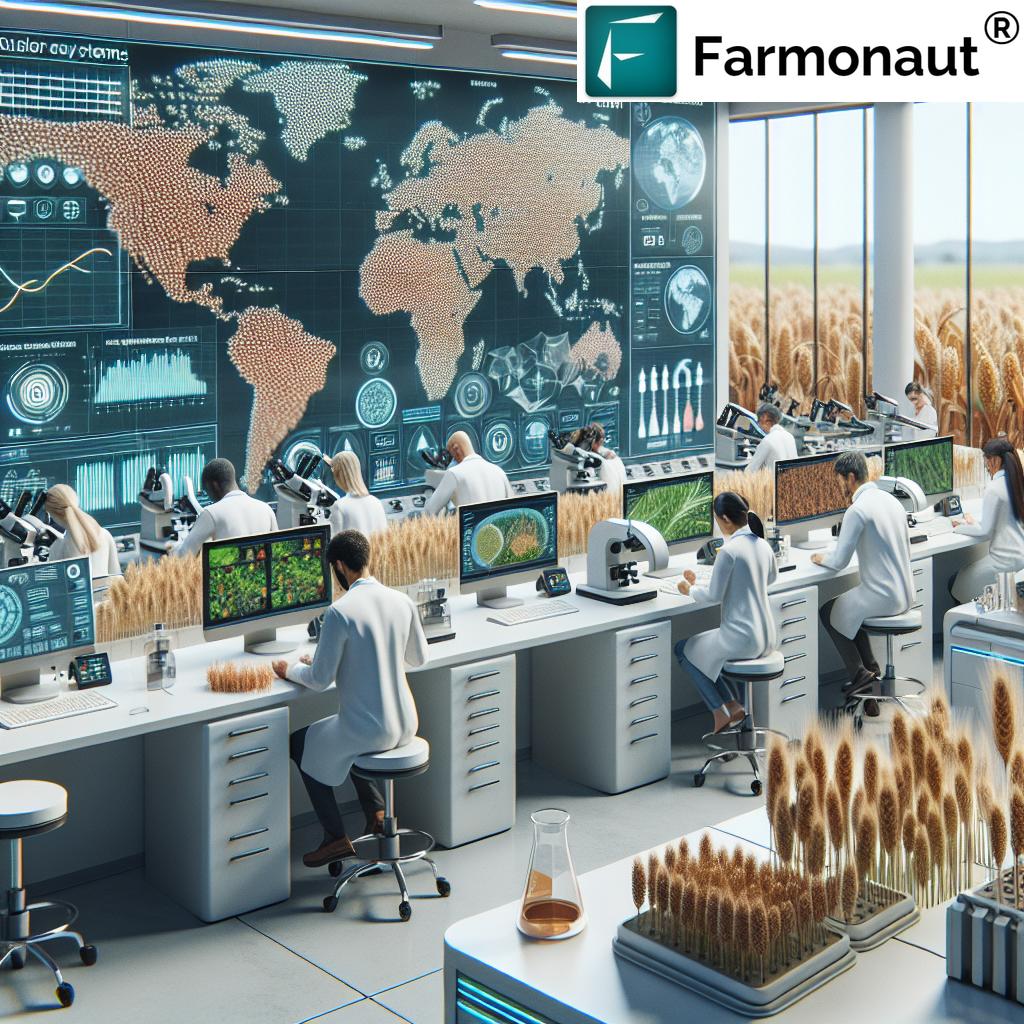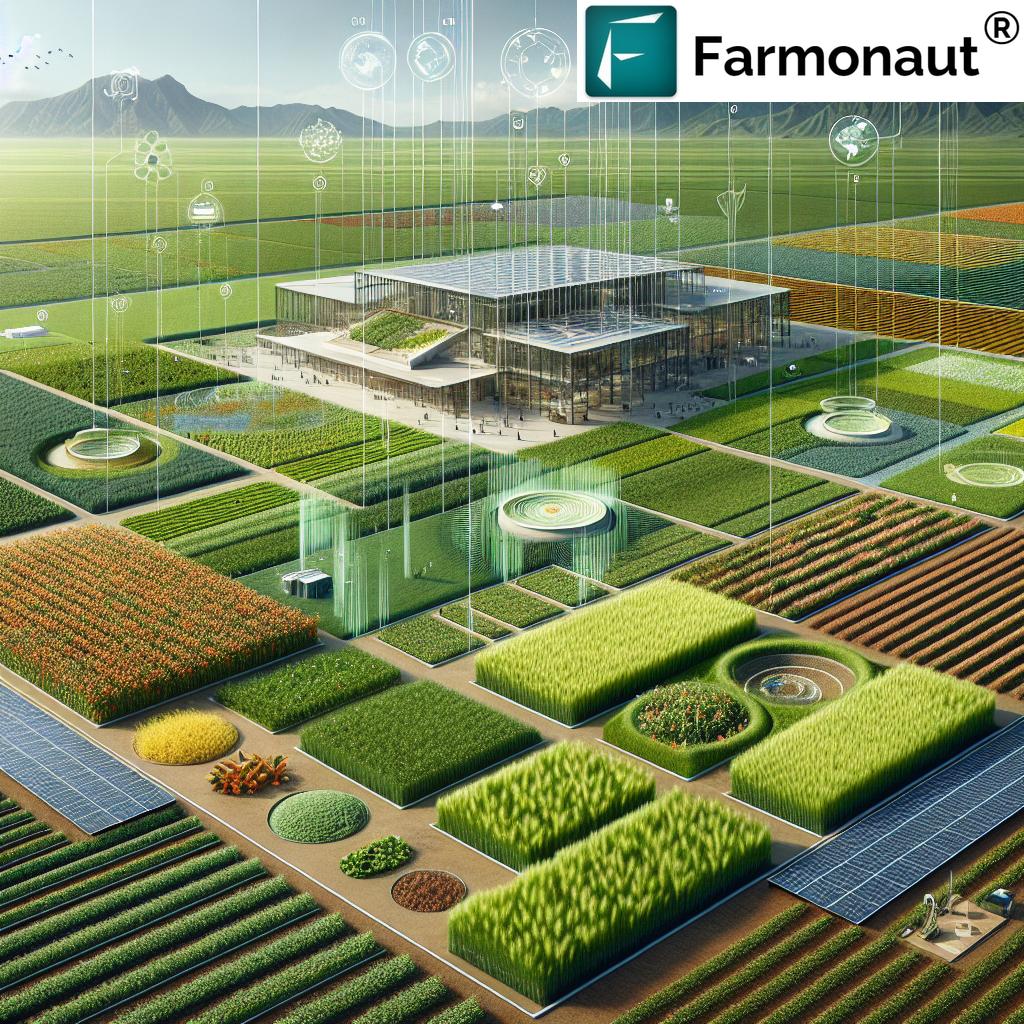Revolutionizing Global Food Systems: Kansas Research Drives Sustainable Agricultural Innovation
“Every dollar invested in international agricultural research yields up to $17 in economic benefits, driving sustainable food production globally.”
In the heart of America’s heartland, a quiet revolution is taking place. For over a decade, Kansas State University (K-State) has been at the forefront of global food systems research, spearheading agricultural innovation labs that have reshaped our approach to feeding the world. As we delve into this fascinating journey of discovery and progress, we’ll explore how K-State’s partnership with the U.S. federal government has been instrumental in advancing international agricultural development and bolstering food security on a global scale.
The Power of Partnership: K-State and USAID
Since 2013, K-State has been home to several Feed the Future Innovation Labs, operating in close collaboration with the U.S. Agency for International Development (USAID). These labs have been pivotal in addressing some of the most pressing challenges facing global agriculture today. From developing drought-resistant wheat varieties to improving sorghum crops and implementing cutting-edge pest management strategies, the research conducted at K-State has had far-reaching implications for farmers and communities worldwide.

The impact of this partnership extends far beyond the laboratory. By focusing on sustainable crop production and resilient farming practices, K-State researchers have been instrumental in improving food security in some of the world’s most vulnerable regions. Their work has not only enhanced crop yields but also empowered local farmers with the knowledge and tools they need to adapt to changing environmental conditions.
Groundbreaking Research: A Closer Look
Let’s examine some of the key areas where K-State’s research has made significant strides:
- Drought-Resistant Wheat Varieties: In the face of climate change, developing crops that can thrive in harsh conditions is crucial. K-State’s work on drought-resistant wheat has the potential to revolutionize farming in arid regions, ensuring food security even in the most challenging environments.
- Sorghum Crop Improvement: As a staple food for millions, enhancing sorghum’s nutritional value and resilience has been a priority. The university’s research has led to varieties that are not only more productive but also more resistant to pests and diseases.
- Agricultural Pest Management: Innovative approaches to pest control have been developed, reducing reliance on harmful chemicals and promoting more sustainable farming practices.
“A decade-long university-government partnership has developed drought-resistant wheat varieties, improving crop resilience in challenging climates worldwide.”
The Economic Impact of Agricultural Research
The benefits of international agricultural research extend far beyond the field. A 2022 analysis by K-State researchers revealed a staggering return on investment: for every dollar invested in international research from 1978 to 2018, $8.52 in economic benefit was returned to the United States. This underscores the profound impact that agricultural innovation has on both local and global economies.
As we consider the future of global food systems, it’s clear that technological innovation will play a crucial role. Companies like Farmonaut are at the forefront of this revolution, offering satellite-based farm management solutions that complement and enhance traditional agricultural practices. By leveraging advanced technologies, farmers can make more informed decisions, optimize resource use, and increase crop yields sustainably.
The Ripple Effect: From Kansas to the World
The impact of K-State’s research reaches far beyond the borders of Kansas or even the United States. By addressing global challenges in food production, the university’s work contributes to:
- Improved food security in developing nations
- Enhanced resilience of farming systems in the face of climate change
- More sustainable use of natural resources in agriculture
- Increased economic opportunities for farmers worldwide
This global perspective is essential as we face unprecedented challenges in feeding a growing world population while preserving our planet’s ecosystems.
Adapting to Change: The Future of Agricultural Innovation
While recent changes in federal funding have led to the suspension of some innovation labs at K-State, the university’s commitment to advancing global food systems remains unwavering. The knowledge gained and partnerships forged over the past decade provide a strong foundation for future research and innovation.

As we look to the future, it’s clear that the integration of technology will play an increasingly important role in agricultural research and practice. Platforms like Farmonaut, which offer advanced satellite-based solutions, are becoming indispensable tools for farmers and researchers alike. These technologies enable real-time monitoring of crop health, precise resource management, and data-driven decision-making, all of which are crucial for sustainable agriculture.
The Role of Technology in Modern Agriculture
As we continue to push the boundaries of agricultural innovation, technology is becoming an increasingly integral part of farming practices. Farmonaut’s suite of tools exemplifies this trend, offering solutions that address many of the challenges identified in K-State’s research:
- Satellite-Based Crop Health Monitoring: Real-time data on crop health allows farmers to make informed decisions about irrigation, fertilizer use, and pest management.
- AI-Driven Advisory Systems: Advanced algorithms analyze data to provide personalized recommendations, improving farm productivity and efficiency.
- Blockchain-Based Traceability: Ensuring transparency in the food supply chain, from farm to consumer.
- Resource Management Tools: Optimizing the use of water, fertilizers, and other inputs to promote sustainable farming practices.
These technological advancements complement traditional research efforts, providing farmers with powerful tools to implement the findings of agricultural scientists in real-world settings.
The Impact of Global Food Systems Research
| Research Area | Innovation | Local Impact | Global Impact |
|---|---|---|---|
| Drought-Resistant Wheat | Development of wheat varieties that can thrive in water-scarce conditions | 20% increase in crop yield in drought-prone regions of Kansas | Potential to feed 200 million more people annually in arid regions |
| Sorghum Crop Improvement | Enhanced nutritional value and pest resistance in sorghum varieties | 15% increase in sorghum production in the Midwest | Improved food security for 500 million people in Africa and Asia |
| Agricultural Pest Management | Integrated pest management strategies reducing chemical pesticide use | 30% reduction in pesticide use on Kansas farms | Potential to decrease global pesticide use by 25%, promoting sustainable agriculture |
| Economic Benefits | Return on investment for agricultural research funding | $8.52 returned for every $1 invested in Kansas | Up to $17 in global economic benefits for every $1 invested in international agricultural research |
Bridging Research and Practice: The Role of Farmonaut
As we consider the future of global food systems, it’s clear that bridging the gap between cutting-edge research and on-the-ground farming practices is crucial. This is where platforms like Farmonaut play a vital role. By providing farmers with easy access to advanced agricultural technologies, Farmonaut helps translate research findings into practical, implementable solutions.
For instance, the drought-resistant wheat varieties developed through K-State’s research can be more effectively utilized when farmers have access to precise soil moisture data and weather forecasts provided by Farmonaut’s satellite-based monitoring system. Similarly, the integrated pest management strategies developed by researchers can be more efficiently implemented when farmers can track crop health in real-time and receive AI-driven recommendations for pest control.
Farmonaut’s commitment to making precision agriculture accessible aligns perfectly with the goals of agricultural research institutions like K-State. By offering affordable solutions through their Android and iOS apps, as well as their API for developers, Farmonaut is democratizing access to advanced agricultural technologies.
The Path Forward: Sustainable Agriculture for a Growing World
As we face the challenges of feeding a growing global population in the face of climate change and resource constraints, the importance of sustainable agricultural practices cannot be overstated. The research conducted at institutions like Kansas State University, combined with technological innovations from companies like Farmonaut, offers a roadmap for the future of farming.
Key areas of focus for the future include:
- Climate-Resilient Crop Varieties: Continuing to develop crops that can thrive in changing environmental conditions.
- Precision Agriculture: Leveraging technology to optimize resource use and minimize environmental impact.
- Sustainable Pest Management: Developing strategies that protect crops while preserving biodiversity and reducing chemical use.
- Food Safety and Traceability: Ensuring the safety and transparency of the global food supply chain.
Empowering Farmers: The Farmonaut Affiliate Program
Earn With Farmonaut: Affiliate Program
Earn 20% recurring commission with Farmonaut’s affiliate program by sharing your promo code and helping farmers save 10%. Onboard 10 Elite farmers monthly to earn a minimum of $148,000 annually—start now and grow your income!
Conclusion: A Collaborative Future for Global Food Systems
The story of Kansas State University’s agricultural innovation labs is a testament to the power of collaborative research in addressing global challenges. While the specific programs may be changing, the impact of this work will continue to resonate across the agricultural landscape for years to come.
As we move forward, the integration of research findings with advanced technologies like those offered by Farmonaut will be crucial in translating scientific discoveries into real-world solutions. By combining the insights gained from decades of agricultural research with the precision and accessibility of modern technology, we can create a more sustainable, resilient, and productive global food system.
The journey towards revolutionizing global food systems is ongoing, and it requires the continued dedication of researchers, innovators, policymakers, and farmers worldwide. Together, we can build a future where sustainable agricultural practices not only feed the world but also preserve our planet for generations to come.
FAQ Section
Q: What were the main areas of research at Kansas State University’s Feed the Future Innovation Labs?
A: The main areas of research included developing drought-resistant wheat varieties, improving sorghum crops, and advancing agricultural pest management strategies.
Q: How does agricultural research benefit the economy?
A: According to K-State’s analysis, every dollar invested in international agricultural research from 1978 to 2018 provided $8.52 in economic benefit back to the U.S.
Q: What role does technology play in modern agriculture?
A: Technology plays a crucial role in modern agriculture, offering solutions like satellite-based crop monitoring, AI-driven advisory systems, and blockchain-based traceability, which improve efficiency and sustainability in farming practices.
Q: How can farmers access advanced agricultural technologies?
A: Farmers can access advanced agricultural technologies through platforms like Farmonaut, which offers satellite-based farm management solutions via Android and iOS apps, as well as web-based applications.
Q: What are the key challenges facing global food systems today?
A: Key challenges include climate change, resource constraints, pest and disease management, and the need to increase food production sustainably to feed a growing global population.







